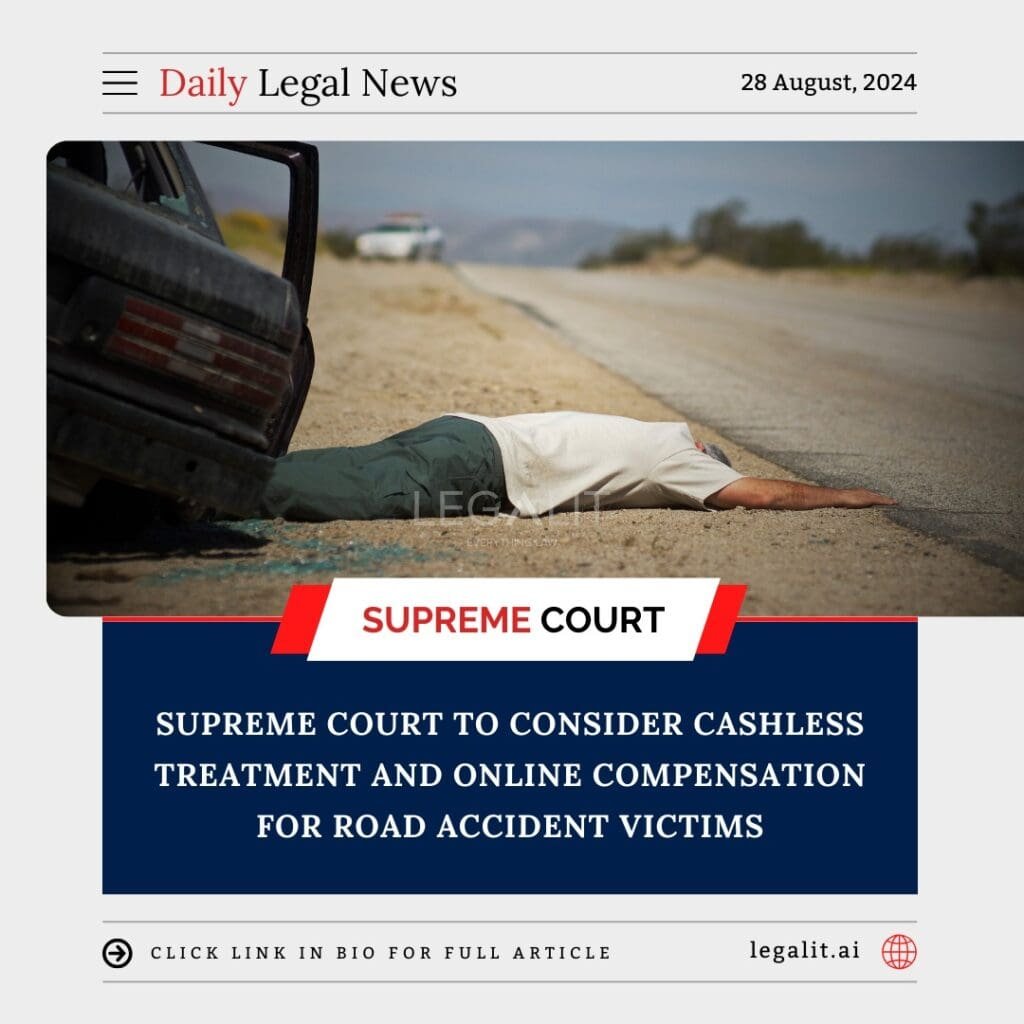
In a groundbreaking move aimed at improving the welfare of road accident victims across the country, the Supreme Court of India is set to consider a proposal that could revolutionize the way compensation and medical treatment are handled in such cases. The proposal suggests the implementation of cashless treatment and the online transfer of compensation to victims, potentially easing the financial and logistical burdens on those affected by road accidents.
Background:
- Current Challenges for Road Accident Victims: Road accidents remain a significant public safety issue in India, with thousands of lives lost and countless others affected each year. Victims often face daunting challenges, including the immediate need for medical treatment and the lengthy process of securing compensation. The financial strain on victims and their families can be immense, particularly in cases where treatment costs are high, and compensation is delayed due to procedural bottlenecks.
- The Need for Reform: The current system for handling road accident cases often leaves victims in a vulnerable position, with delayed access to both medical care and financial compensation. The proposal before the Supreme Court seeks to address these issues by streamlining the process, ensuring that victims receive timely and adequate support. The move is seen as part of a broader effort to improve road safety and accident response mechanisms in India.
Key Elements of the Proposal:
- Cashless Medical Treatment: One of the central aspects of the proposal is the introduction of cashless treatment for road accident victims. Under this system, victims would be able to receive immediate medical attention without the need to arrange for payment upfront. The costs of treatment would be covered by insurance companies or a government-backed fund, reducing the burden on victims and ensuring that they receive the care they need without delay.
- Online Compensation Transfer: Another critical component is the online transfer of compensation to victims or their families. This would involve a streamlined process where compensation is calculated and disbursed electronically, reducing the time and effort required to access funds. By moving the process online, the proposal aims to eliminate delays and enhance transparency, ensuring that victims receive their due compensation promptly.
Implications for Victims and the Legal System:
- Immediate Access to Care: The cashless treatment system could be a game-changer for accident victims, allowing them to access necessary medical services immediately after an accident. This could significantly improve survival rates and reduce the long-term impact of injuries by providing timely medical intervention.
- Simplification of Compensation Claims: The move to online compensation transfers would simplify the claims process, making it easier for victims to receive their entitled compensation. This could alleviate the financial stress on victims and their families, particularly in cases where the primary breadwinner is incapacitated or deceased due to the accident.
- Improved Efficiency and Transparency: The proposed reforms could lead to a more efficient and transparent system for handling road accident cases. By reducing bureaucratic delays and leveraging digital technologies, the proposal aims to create a more victim-friendly system that prioritizes the needs of those affected by road accidents.
Challenges and Considerations:
- Implementation and Infrastructure: While the proposal is promising, its successful implementation will require significant investment in infrastructure, particularly in terms of digital platforms for online compensation transfers and coordination between hospitals, insurance companies, and government agencies. Ensuring that the system is accessible to all, including those in rural areas, will be critical.
- Ensuring Accountability: The shift to cashless treatment and online compensation must be accompanied by robust mechanisms to ensure accountability. This includes preventing fraud, ensuring that victims receive adequate compensation, and maintaining the quality of medical care provided under the cashless system.
- Collaboration Between Stakeholders: The success of the proposal will hinge on effective collaboration between various stakeholders, including the judiciary, government bodies, insurance companies, and healthcare providers. Each of these entities will need to work together to ensure that the system operates smoothly and meets the needs of accident victims.
Conclusion:
The Supreme Court’s consideration of cashless treatment and online compensation for road accident victims marks a potentially transformative moment in the way India addresses the aftermath of road accidents. By prioritizing the needs of victims and streamlining the process for accessing medical care and compensation, the proposal could significantly improve outcomes for those affected by road accidents.
As the Supreme Court deliberates on this proposal, there is hope that these reforms will lead to a more efficient, transparent, and victim-centric approach to handling road accident cases in India. If implemented successfully, the changes could serve as a model for other countries facing similar challenges, ultimately leading to a safer and more supportive environment for road users across the nation.